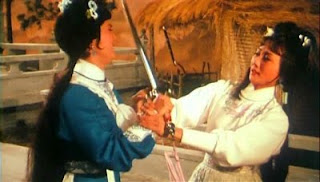
Logo for the Great Wall Film Production Company, one of the left-wing studios which flourished in Hong Kong in the 1960s. As well as social dramas, Great Wall also produced a number of successful "swordplay" (wuxia) films, which apparently differed little from those produced by less politically-motivated studios. Image from: http://www.illuminatedlantern.com/cinema/archives/a_history_of_hong_kong_production_company_logos_part_one_the_early_years.php
The following passage – from Hung Ho-Fung's article, "Uncertainty in the Enclave," New Left Review 66 (Nov/Dec 2010):55-77 – gives us something of an outline of the socio-political context of the production of wuxia ("swordplay") films in the 1960s and that of "kung fu" films proper in the early 1970s:
The US embargo on trade with the PRC, introduced in 1950, voided Hong Kong's purpose as a commercial entrepôt, so its capitalists turned instead to manufacturing. Industrial employment roses from a mere 5 per cent of the workforce in 1950 to 10 per cent in 1960, rising to 25 per cent in 1970. At the same time, the colony saw an influx of refugees from the mainland, who contributed to a huge increase in the population: from 600,000 in 1945 to 2.5 million in 1955. The new arrivals included small-scale entrepreneurs from Guandong or textile magnates from Shanghai, who helped fuel Hong Kong's industrial takeoff, but the majority of the refugees were peasants and workers who provided Hong Kong's emerging industries with low-cost labour. They settled in urban slums, which became fertile ground for CCP-affiliated organizations—including a myriad of unions grouped around the Federation of Trade Unions, as well as schools, news agencies and filmmakers.
In the 1950s and 60s, these organizations grew against a backdrop of rampant government corruption, police brutality, class polarization and institutionalized discrimination against Chinese. Leftist Unions frequently flexed their muscle with strikes. Their film companies—Southern Film, Great Wall, Phoenix, Longma—made box-office hits portraying the misery of the working class and helped disseminate propaganda about the new socialist China. Leftist community organizations, replete with supplies from the PRC, were often more effective than the colonial administration in delivering disaster relief in the aftermath of the fires, landslides and typhoons that constantly threatened working-class neighbourhoods, which usually consisted of wooden shacks perched on Hong Kong's hilly terrain.
In the Spring of 1967, the CCP-affiliated Hong Kong and Macao Work Committee, under the influence of the cultural revolution, made use of a minor labour dispute to launch an all-out offensive against the colonial [p.58] authorities, rallying and directing other leftist forces in the colony. This was meant to generate a revolutionary crisis that ignited all political and social contradictions at once, paved the way for a CCP takeover, or at least for conjoint rule over the colony by the British and the Left, as had been achieved in the insurgency against the Portugese in Macao in late 1966. In the initial phase of the Kong Kong uprising, mass rallies and demonstrations organized by the Leftists drew broad, spontaneous support among the Chinese population. However, the tide turned when Chinese Premier Zhou Enlai reaffirmed to the British the CCP's policy of maintaining Hong Kong's colonial status. Emboldened by Beijing's non-interference, the colonial authorities mobilized the security forces to crack down on the Leftists, closing down their unions, schools and newspapers, and deporting key leaders to the PRC. Pushed into a corner, the Leftists resorted to terrorist tactics, such as roadside bombs targetting both government facilities and civilians. This violent turn alienated the wider Chinese community, costing the insurgents popular support.
The insurgency had subsided by early 1968. Though many Leftist organizations resumed their activities under the colonial authorities' watchful eyes, they became ever more marginalized and demoralized during the 1970s. With a renewed sense of urgency, the colonial government set about shoring up its legitimacy. It managed to break the usual resistance from its business allies, and, under the influence of Fabian socialist currents in the UK, began a series of social and administrative reforms in the early 70s. These included public assistance for the poor, universal free education for nine years, government sponsored social services, and an effective and internationally acclaimed anti-corruption agency. The authorities also built the world's largest public housing system, which accommodated more than half of Hong Kong's population—4 million in 1970, growing to 5 million by 1980.
In tandem with these reforms came the student movement. In the early 1970s, the memory of the 1967 insurgency was still fresh among student radicals, who were also influenced by the world-wide student revolts of 1968, and sympathetic to the CCP. With a unifying theme of "anti-colonialism and anti-capitalism," the movement sprang up in 1971 in protest against the American handover to Japan of the [p.59] Diaoyu/Senkaku Islands, which China claimed were its territory. The movement soon split into two main currents: A Maoist faction, which focused on propagandizing the the achievements of socialist China and paid little attention to struggles in Hong Kong, and a "social faction," which was critical of the CCP regime's authoritarianism and directed its efforts into supporting local social movements (pp.57-9).
I have also come across other (slightly conflicting) accounts regarding the political climate of that moment. (They will have to wait for a later moment.) What perhaps seems surprising or interesting in Hung's acount is that the kung fu genre, which is more often explicitly concerned with representing uprisings and insurgency than the older wuxia genre arrives not in the midst of the unrest, but only after it, at the moment in which politics is becoming more conservative, radical change seems blocked – the moment also when the colonial government had softened its laissez-faire attitude and started introducing welfare-state-type referms supporting the poorest in society and attempting to root out some of the corruption which had been so rife in the economic and political life of the colony (and which is reflected so frequently in the thematics of both wuxai and kung fu films...).

Still from Great Wall's wuxia film, The Jade Bow (1966).



